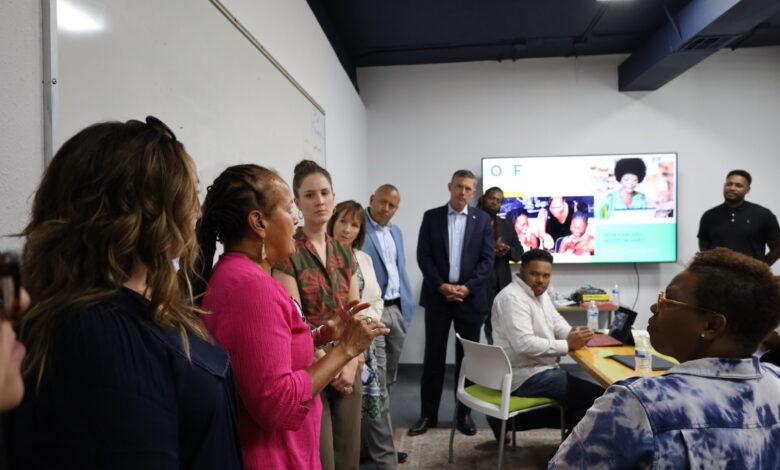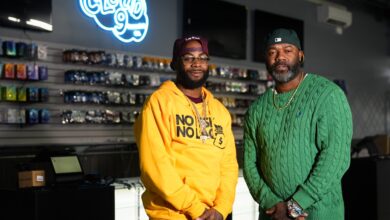New financial institution announces first major loans to BIPOC businesses on Juneteenth • Source New Mexico

If it weren’t for a newly running financial institution that gives loans to people of color, Finnie Coleman said his small business couldn’t afford to stay afloat.
He’s been involved in the pet care industry for years and soon wants to start fostering dogs that are set to be euthanized. With help from the newly organized One Hope Financial Institution, Coleman is closing on a new location in Albuquerque’s International District and plans to open up shop in July.
“These guys are going to keep us afloat,” he said. “They’re going to get us the capital that we need.”

Coleman will be the recipient of one of two major loans — the first of their kind One Hope Financial Institution is giving out — this summer. The other is going to Bette Allen, founder of the local Taproot Therapeutic Landscape Design.
One Hope plans to loan each of the businesses $50,000.
The loans are unique because they’re personal, community-based and meant specifically for people of color.
At a public lunch in the International District on Monday, One Hope Financial Institution directors announced the loans and talked about their new financial services organization that focuses on getting capital to businesses run by Black, Indigenous, and people of color.
Director Charles Ashley said One Hope has been years in the making and aims to get capital to people who can’t traditionally access it.
“You’re going to see the proof in the pudding from us,” he said. “It’s not just all talk; you’ll see the actual investments taking place.”
Dr. Everette Hill, another one of the directors, said One Hope is trying to give out loans in nontraditional ways, with a goal to stop perpetuating inequities in typical financing systems that hurt people of color.

Only 23 of 5,400 financial institutions were owned and run by Black people in 2018, Forbes reported with recent federal data. NPR reported that this is connected to a larger systemic issue that hundreds of years of “exploitation and exclusion have left us with a financial system that is primarily geared toward serving white communities.”
The One Hope Financial Institution event was held on the federal holiday Juneteenth. Hill said historical marginalization has led to things like people of color not being able to get loans from banks.
“People are earnestly thinking about this — the importance of a group of people not learning they were free for two years. For two additional years in a brutal system,” Hill said.
“Those systems have left a legacy of inequities,” he said. “We are trying to develop some systems here that can begin to push against those legacy inequities in those systems that we all inherited. We’re trying to do something a little different.”
Hill said that’s why these two new major loans are so important. He said One Hope Financial Institution has had a few smaller loans but these are the two first larger loans approved by the organization’s board of directors.
“As we celebrate Juneteenth and we think about our communities, African American communities, part of what this work was about as well is our ability to partner with other communities,” he said.
U.S. Sen. Martin Heinrich attended the event and said there are many who haven’t had access to capital who deserve it. He said if people have access to capital and reasonable interest rates, they can lift the entire community up with their business.
“There’s enormous potential if we can get deeper than somebody’s (credit) score for getting people to a position where they’re really thriving in their entrepreneurship,” Heinrich said. “And the traditional lending space doesn’t get you there.”
Ashley said most of the people who got One Hope up and running have had personal experiences with bad or inequitable loan conditions.

His own mother took out poor payday loans and was always behind on her debt, he said, but still paid her bills on time. Nonetheless, he said, when she tried to get a loan for a house, the bank wouldn’t give it to her because her debt-to-income ratio was so bad.
“That sparked us to say, ‘What if we just refinance these bad loans and help people get back on their feet?’” he said.
Four pillars
The directors said they plan to make loans that traditional banks wouldn’t normally by:
- Providing loans based on a person’s character, not their credit history
- Ensuring that there will be community-based investments
- Refinancing bad payday loans — short-term, high-credit loans based on income
- Refinancing bad medical debt
Similarly, Hill and his wife racked up medical debt after a difficult pregnancy which he said they wouldn’t have been able to pay back if he hadn’t known someone who understood medical bills and insurance policies and had some of their own savings.
“But we began to wonder who else was out there experiencing the same thing, who might not have had the ability to take care of that,” he said. $60,000 or $70,000 in debt is just enough to prohibit someone from starting or running a business, he said.
Experts have said predatory lenders in New Mexico often leave people — targeting Native and other communities of color — in endless cycles of debt.
Ashley said the goal is to allow people to go to the bank after a few years to get that loan they initially couldn’t.
He said he hopes all the elected officials that came to the event commit to helping One Hope thrive.
Indeed, Albuquerque Mayor Tim Keller said the city government is sending about $500,000 to One Hope after paperwork gets finalized. That’s coming from a $1 million fund set aside three years ago for investments in the Black community following the murder of George Floyd.
“Thank you for continuing that fight and for outlining and setting up this,” he told the directors at the event.
Heinrich said he wants to help connect the institute to other sources, from equity financing avenues to people with whom they can partner.

“We’ll play whatever role we can to make sure that they’re successful,” Heinrich said.
Ashley said they’ll invite everyone back every three months or so for these lunches. He said they want to keep it intimate to spread information and connect people to others and beneficial resources.
Coleman said to start out on Monday at least, he wants to meet with others who think they can help keep his small business alive. Even though One Hope is giving out the loan for his dog housing program, he said, more could still be done.
“We need more space,” he said. “We need more resources.”























































